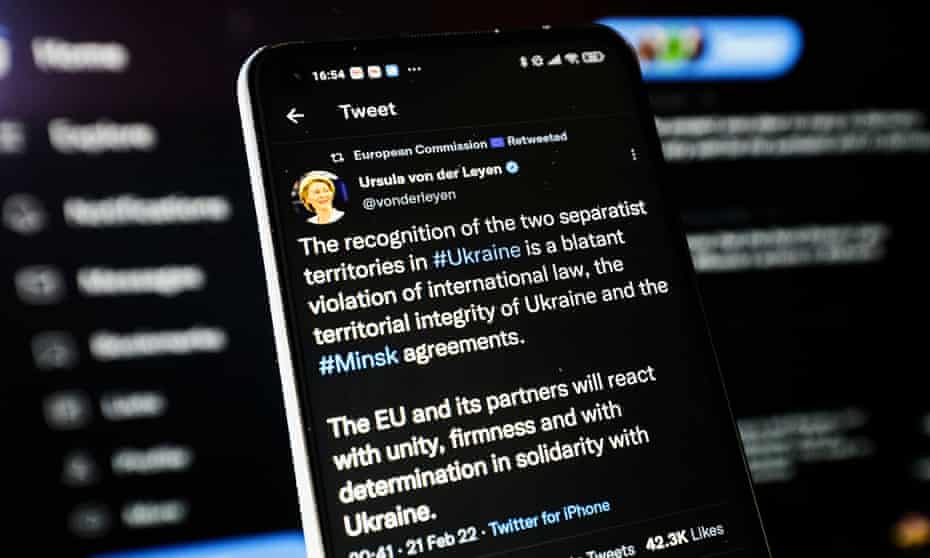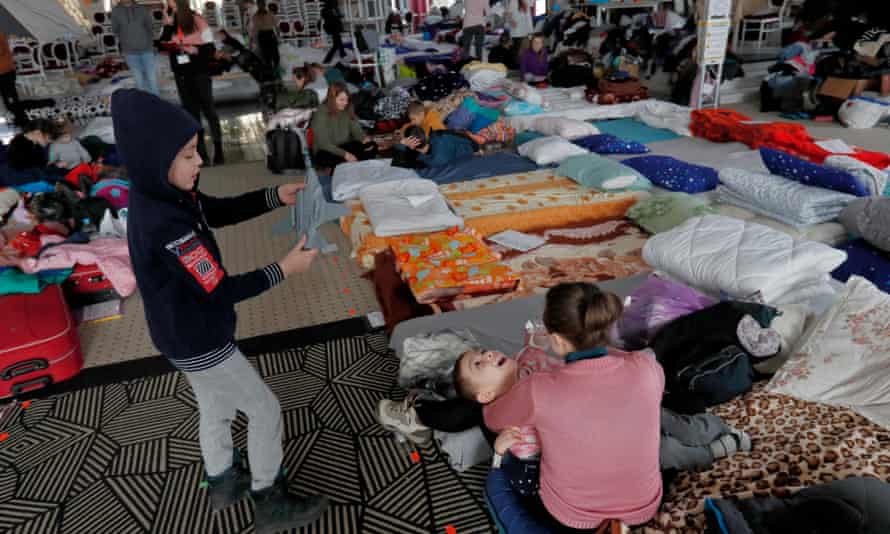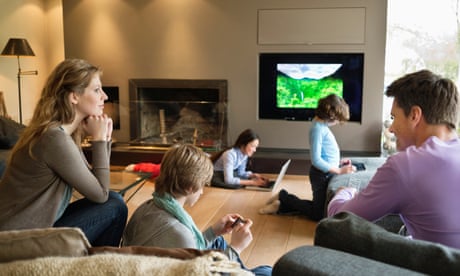As happened with Covid, the compulsive need to keep up with the Russian invasion is taking a toll on our mental health

The pace of the crisis in Ukraine has created a brain-tangling complexity for anyone trying to understand what is going on. Now doomscrolling is back in ways not seen since the beginning of the Covid pandemic.
Mental health experts are warning that public engagement comes with a cost in terms of anxiety that should not be ignored. Paul Salkovskis, professor of clinical psychology at the University of Oxford, who worked on measures to help people deal with Covid-related anxiety, said: “Clearly there are some people who are already anxious, who will be significantly more anxious, as happened with Covid – we saw a big increase in some subtypes of anxiety in the clinic. There will be some of that with this situation, but I don’t think it’s going to be the dominant response.”
The cognitive theory of anxiety suggests that it is a response to threat, which can be entirely rational but needs intervention when it becomes disabling, explained Salkovskis, who is also a consultant at Oxford Health NHS foundation trust.
“The question is, why for some people is it particularly severe? And why is it particularly persistent?”
Uncertainty plays a role in assessing those questions, he said, and is part of the motivation underlying behaviours such as doomscrolling: the urge to understand the nature of the threat – how likely it is, what the consequences might be, how you might cope and who might be able to help.
There are important differences between the impact of the pandemic and the war in Ukraine. The requirement to socially distance made it harder for people to support each other, Salkovskis said.
Public reaction in the UK and elsewhere to the war may seem trivial compared with the horrific realities for the people caught up in it, but it has also driven political action. Anger at the suggestion by Kevin Foster, the immigration minister, that Ukrainian refugees might apply for fruit-picking visas to come to the UK seemed to provoke a rapid change of policy at the Home Office.
The modern response that many have of watching events unfold on social media means there are fewer people to empathise with, since other social media users seem distant and anonymous, even if they are identifiable. Dr Dean Burnett, a neuroscientist and honorary research associate at Cardiff university, said the fact the crisis was still unfolding meant people were experiencing a kind of perpetual cliffhanger that made it harder to disengage.
Yet the war has more clarity than the pandemic, he added. “For most people, the big bad guy has attacked the underdog, and the underdog has put up more of a fight and the bully’s not getting his own way. It’s easier for our brains to understand. With the virus, it was harder to do that. It had no goals, no agenda – it’s just a pathogen. One of the reasons for the conspiracy theories was that people wanted to put some sort of narrative or order on to things.”

Professor Barbara Sahakian, from the University of Cambridge’s Department of Psychiatry, said many people had been dealing with chronic stress since the lockdowns began, with threats from Covid and the cost of living, as well as the environment.
“Now there are threats to European and global security,” she said. “To some, it may seem that there is never any good news any more. This is, of course, not true but it is important that people do not spend time doomscrolling but instead show resilience and gain mastery over the situation.”
Juliet Landau-Pope, a productivity coach from London, has been looking for ways to help Ukrainians. She said: “I’ve had the news on round the clock. I’ve been waking up in the night and checking my phone, reading newspaper reports, and watching BBC constantly, CNN, the Times of Israel.”
She is recovering from Covid and had been looking forward to going out again. “But I’ve lost all inclination to socialise. It feels too trivial.” Instead, on Saturday she went to a local church to donate clothes for Ukrainian refugees.
It’s a pattern of behaviour familiar to Kay Worboys, a copywriter who became so concerned by her obsession with Covid facts that she began to train as a counsellor.

“Last week, I could feel myself falling into the same trap I was in during the spring of 2020,” she said. “In the early days of Covid, I was online all the waking hours, looking for all the facts and figures. When I stopped to make food or a cuppa, I put the radio on. Before bed, I’d watch the news. Then, of course, I found I couldn’t sleep. And then last week I felt those old habits creeping in. Checking the news, having the radio on, doomscrolling on the train home, before bedtime, after watching the news.”
Worboys became exhausted, anxious, angry and upset, particularly by some graphic images of a war victim she encountered on Twitter. “I’ve now limited myself to checking four times a day,” she said.
Anna Cargan, who runs Buildabundle, a second-hand children’s clothes website, has also been trying hard not to engage. “I suffered an anxiety disorder in the past and I don’t want to go back there,” she said. “I’m not avoiding it completely – that would be impossible – but I’m definitely not immersing myself in news. Me scrolling won’t help Ukraine. I’m looking to donate to charities.”
Thank you for joining us from India.
Russia’s invasion of Ukraine has abruptly transformed the world. Millions of people have already fled. A new Iron Curtain is grinding into place. An economic war deepens, as the military conflict escalates, civilian casualties rise and evidence of horrific war crimes mounts.
It’s our job at the Guardian to decipher a rapidly changing landscape, particularly when it involves a mounting refugee crisis and the risk of unthinkable escalation. Our correspondents are on the ground in Ukraine and throughout the globe delivering round-the-clock reporting and analysis during this perilous situation.
We know there is no substitute for being there – and we’ll stay on the ground, as we did during the 1917 Russian Revolution, the Ukrainian famine of the 1930s, the collapse of the Soviet Union in 1991 and the first Russo-Ukrainian conflict in 2014. We have an illustrious, 200-year history of reporting throughout Europe in times of upheaval, peace and everything in between. We won’t let up now.
Tens of millions have placed their trust in the Guardian’s fearless journalism since we started publishing 200 years ago, turning to us in moments of crisis, uncertainty, solidarity and hope. We’d like to invite you to join more than 1.5 million supporters from 180 countries who now power us financially – keeping us open to all, and fiercely independent.
Unlike many others, the Guardian has no shareholders and no billionaire owner. Just the determination and passion to deliver high-impact global reporting, always free from commercial or political influence. Reporting like this is vital to establish the facts: who is lying and who is telling the truth.
And we provide all this for free, for everyone to read. We do this because we believe in information equality. Greater numbers of people can keep track of the global events shaping our world, understand their impact on people and communities, and become inspired to take meaningful action. Millions can benefit from open access to quality, truthful news, regardless of their ability to pay for it.
If there were ever a time to join us, it is now. Every contribution, however big or small, powers our journalism and sustains our future. Support the Guardian from as little as $1 – it only takes a minute. If you can, please consider supporting us with a regular amount each month. Thank you.


